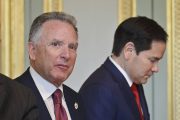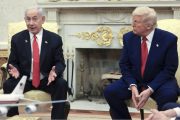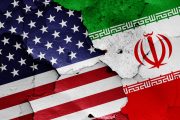
A poll released on December 3 by the Pew Research Center for the People & the Press revealed that 49 percent of Americans believe that their country should should "mind its own business internationally." Pew headlined its report about the poll in the language long favored by those advocating an interventionist U.S. foreign policy: "Isolationist Sentiment Surges to Four-Decade High.”
The poll was conducted by Pew for the internationalist Council on Foreign Relations (CFR), a New York-based policy group whose members have dominated U.S. foreign policy since World War II. An interesting facet of the report polled CFR members separately and compared those results with members of the general U.S. public. It noted that while both the general public and CFR are “apprehensive and uncertain about America’s place in the world,” the general public, “which is in a decidedly inward-looking frame of mind when it comes to global affairs, is less supportive of increasing the number of U.S. troops in Afghanistan than are CFR members.”
According to AP, the poll findings come from two surveys made before President Obama’s plan to increase U.S. troop levels in Afghanistan was announced on December 1. The first survey polled 2,000 adults by telephone from October 28 to November 8, and a subsequent poll of 1,003 people conducted from November 12-15.
The Pew report based on the survey noted:
Fewer than half of the public (46%) and CFR members (41%) say it is very or somewhat likely that Afghanistan will be able to withstand the threat posed by the Taliban. While half of the CFR members (50%) favor increasing the number of troops in Afghanistan, just 32% of the public agrees.
The report continued, using the language long favored to discredit those who oppose interventionism:
In the midst of two wars abroad and a sour economy at home, there has been a sharp rise in isolationist sentiment among the public. For the first time in more than 40 years of polling, a plurality (49%) says the United States should “mind its own business internationally” and let other countries get along the best they can on their own. [Emphasis added.]
Because of the persistence among the nation’s dominant news and policy organizations in branding a non-interventionist foreign policy as “isolationism,” it is a worthwhile exercise to examine not only the meaning of the terms, but the actual foreign policies advocated by our leaders throughout our history.
George Washington, in his Farewell Address published on September 17, 1796, recommended: “Observe good faith and justice toward all nations. Cultivate peace and harmony with all…. A passionate attachment of one nation for another produces a variety of evils. Sympathy for the favorite nation, facilitating the illusion of an imaginary common interest in cases where no real common interest exists, and infusing into one the enmities of the other, betrays the former into a participation in the quarrels and wars of the latter without adequate inducement or justification.”
While Washington warned against involvement in the quarrels and wars of other nations, his advice to “observe good faith and justice toward all nations” and to “cultivate peace and harmony with all” could hardly be called “isolationist.”
Similar sentiments were made by other early American leaders. John Quincy Adams observed that “America does not go abroad in search of monsters to destroy. She is the well-wisher to freedom and independence of all…. She is the champion and vindicator only of her own.”
While the merits (and pitfalls) of the wars and foreign adventures engaged in by our nation during the 19th century could be argued endlessly, it was our entry into World War I that was a harbinger of today’s “interventionist” foreign policy. After being reelected in 1916 with the slogan, "he kept us out of war” (Americans in 1916 obviously favored a policy that some later would call “isolationist”), President Woodrow Wilson on April 2, 1917, went before a joint session of Congress to seek a Declaration of War against Germany in order that the world “be made safe for democracy.” The war in Europe may have been none of our business, but at least Wilson had enough respect for the Constitution to seek a declaration of war from Congress, as the Constitution requires.
Perhaps not coincidentally, Wilson’ chief foreign policy advisor, Edward Mandell House, was in 1921 a founding member of the Council on Foreign Relations, the very organization requesting this recent poll from the Pew Research Center.
Almost 20 years later, as another world war raged in Europe, the term “isolationist” began to be used to disparage those who opposed U.S. entry into the war, such as the famous aviator Charles Lindbergh. However, such opposition to the war evaporated upon the bombing of Pearl Harbor by the Japanese in December 1941.
Not surprisingly, Benjamin Sumner Welles, a major foreign policy advisor to President Franklin D. Roosevelt who served as Under Secretary of State from 1937 to 1943, was also a member of the CFR.
Starting with Woodrow Wilson, continuing with Franklin Roosevelt, and almost continuously since, a CFR-heavy group of interventionists has dominated U.S. foreign policy and the organs molding public, bringing out the “isolationist” guns whenever needed to shoot down anyone who opposes their expansionist agenda.
But as Rep. Ron Paul noted in his Texas Straight Talk newsletter of December 18, 2006 :
I believe our founding fathers had it right when they argued for peace and commerce between nations, and against entangling political and military alliances. In other words,
Noninterventionism is not isolationism. Nonintervention simply means America does not interfere militarily, financially, or covertly in the internal affairs of other nations. It does not we that we isolate ourselves; on the contrary, our founders advocated open trade, travel, communication, and diplomacy with other nations….
It is time for Americans to rethink the interventionist foreign policy that is accepted without question in Washington. It is time to understand the obvious harm that results from our being dragged time and time again into intractable and endless Middle East conflicts, whether in Iraq, Iran, Syria, Lebanon, or Palestine. It is definitely time to ask ourselves whether further American lives and tax dollars should be lost trying to remake the Middle East in our image.




